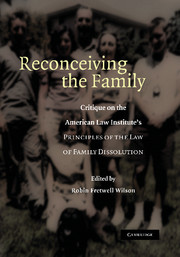 Reconceiving the Family
Reconceiving the Family Book contents
- Frontmatter
- Contents
- Acknowledgments
- Foreword, by Mary Ann Glendon
- List of Contributors
- Introduction
- PART ONE FAULT
- PART TWO CUSTODY
- PART THREE CHILD SUPPORT
- PART FOUR PROPERTY DIVISION
- PART FIVE SPOUSAL SUPPORT
- PART SIX DOMESTIC PARTNERSHIP
- PART SEVEN AGREEMENTS
- PART EIGHT JUDICIAL AND LEGISLATIVE PERSPECTIVES
- 21 A Formula for Fool's Gold: The Illustrative Child Support Formula in Chapter 3 of the ALI's PRINCIPLES
- 22 A Response to the PRINCIPLES' Domestic Partnership Scheme
- PART NINE INTERNATIONAL REFLECTIONS
- Afterword: Elite Principles: The ALI Proposals and the Politics of Law Reform, by Carl E. Schneider
- Index
22 - A Response to the PRINCIPLES' Domestic Partnership Scheme
Published online by Cambridge University Press: 25 January 2010
- Frontmatter
- Contents
- Acknowledgments
- Foreword, by Mary Ann Glendon
- List of Contributors
- Introduction
- PART ONE FAULT
- PART TWO CUSTODY
- PART THREE CHILD SUPPORT
- PART FOUR PROPERTY DIVISION
- PART FIVE SPOUSAL SUPPORT
- PART SIX DOMESTIC PARTNERSHIP
- PART SEVEN AGREEMENTS
- PART EIGHT JUDICIAL AND LEGISLATIVE PERSPECTIVES
- 21 A Formula for Fool's Gold: The Illustrative Child Support Formula in Chapter 3 of the ALI's PRINCIPLES
- 22 A Response to the PRINCIPLES' Domestic Partnership Scheme
- PART NINE INTERNATIONAL REFLECTIONS
- Afterword: Elite Principles: The ALI Proposals and the Politics of Law Reform, by Carl E. Schneider
- Index
Summary
South Carolina, a state that celebrated its Tri-Centennial thirty-six years ago in 1970, has always been a place where traditions are revered. South Carolina is one of the few remaining states that continue to recognize common law marriage, at one time a widely recognized doctrine in the United States. Our legal doctrine of common law marriage, hoary in some circles, remains vibrant and relied upon today by citizens of South Carolina.
While the recognition of common law marriage brings with it certain inherent difficulties which have contributed to the decline of the doctrine elsewhere, common law marriage continues to serve an important function by recognizing relationships that are marital in character, but lack the necessary predicate of a formal marriage license. This legal recognition acknowledges that important property distribution rights and support obligations attach when a relationship of this character dissolves. Without doubt, the extensive scholarship that resulted in the publication of the Principles focused on serving much of this same protective function. As a Chief Justice who well remembers her prior life as a state legislator, however, I am forced to cast a skeptical eye on the Principles' proposed reforms.
This chapter focuses on the Principles' approach to property division and support obligations, especially as these concepts are applied to unmarried cohabitating couples. It explains why I think that imposing legal obligations such as these is better done through the doctrine of common law marriage.
- Type
- Chapter
- Information
- Reconceiving the FamilyCritique on the American Law Institute's Principles of the Law of Family Dissolution, pp. 425 - 432Publisher: Cambridge University PressPrint publication year: 2006


